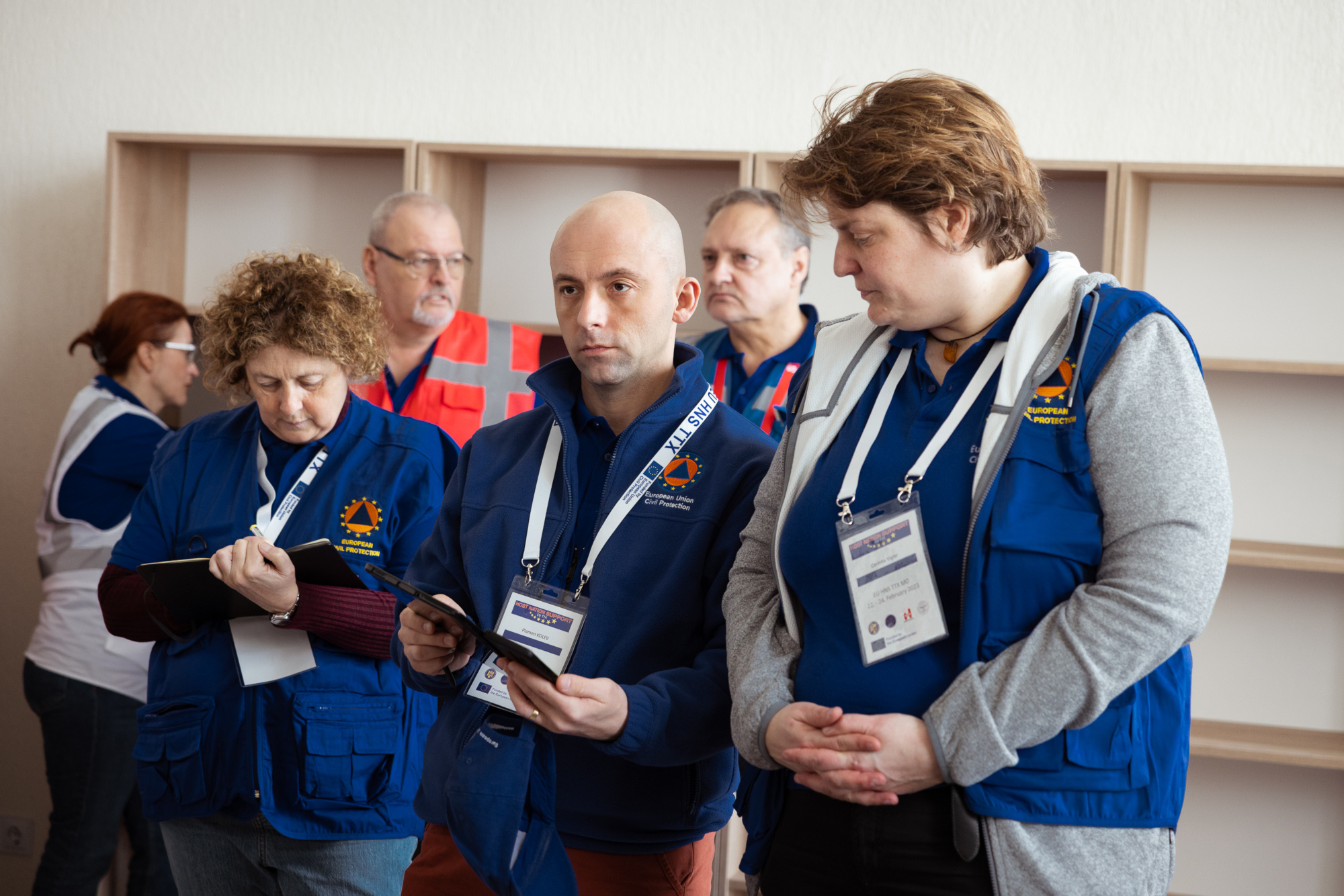Review of the second EU HNS tabletop exercise, successful but challenging conducted in close cooperation with the Inspectorate General pentru Situații de Urgență al MAI – General Inspectorate for Emergency Situations (IGSU) of the Republic of Moldova, funded by the European Union to promote Host Nation Support. More than 90 Civil Protection experts from 14 countries brought their experience to this EU Host Nation Support tabletop exercise.
Since this TTX is in Europe but Moldova is not part of the EU or UCPM family, what are the main challenges for working together if help is needed?
„It is important that the participants had the online course in advance about how Host Nation Support works. Since they are familiar with the idea of it, the challenge after the clarification for international assistance was decided, is how to receive and support the assistance for the coordinated response in the requesting state. The main challenge is definitely how the stakeholders, neighbouring countries and the receiving country, in that case, the Republic of Moldova and their national authorities and emergency services can optimise to work together with the UCPM to be prepared for real disasters.“, so Dr Bogdan Pop the Project Director.
The process of the TTX: before the TTX started, a dry run exercise with the national authority (IGSU) was conducted, followed by an introduction to the use of virtual reality. On the first day of the “disaster”, where an earthquake hit the country with a following blackout was simulated. After assessing and analysing the situation the Request for Assistance was issued. The exercise started on day 2 of the disaster when the UCPM teams and international organisations arrived to respond. After lunch, there was a time jump, in the afternoon the situation on day 3 of the disaster was simulated, mainly to enable the work of the rescue teams with the support of the host nation.
On the second day of the TTX, the situation of “disaster day 7” and disaster day 14“ were simulated, where team rotation happened and the first international rescue teams are returning to their home bases.
For the EU HNS TTX in Moldova, the EUCPT and a TAST, seven skeleton and virtual modules, and other response capacities have participated. The EUCPT at the TTX in Moldova was led by the team leader, Vigier Corinna, and assisted by a deputy and two more coordination and assessment experts. They were supported by a Liaison Officer from the ERCC, Adrien Eric and a TAST team.
What was the scenario of the second TTX in the Republic of Moldova? What were the main objectives of this exercise?
„We simulated an earthquake with cascading effects, which hit the country. For us, it is important, that every participant has the experience from the exercise, where they can work in difficult situations and learn from them. They should be able to respond faster and be familiar with this kind of emergency response. We also offered the HNS Quick Reference Card, and the EU HNS pocket guide, items of the HNS toolkit, which escorted the participants through the exercise.“, summarises Project Manager Josef H. Riener.
On the last day a hot wash-up from the evaluators, led by Prof. Dr Cristian Boeriu from the University of Medicine, Pharmacy, Science and Technology of Târgu Mureş followed. The certificate handover to the participants and staff of the EU HNS project tabletop exercise was the finalisation of the TTX Moldova.
In total 24 experts from IGSU were working at the HNS cell together with representatives of 12 ministries and 4 experts in the UCPM, supported by a Liaison Officer from the ERCC. Representatives from 12 ministries, IOM – UN Migration and UNHCR, the UN Refugee Agency were present. The international intervention teams were represented by three USAR and EMT skeleton modules (team leader and deputy team leader) and further 2 EMT, 3 USAR, and 2 CBRN modules, and a team of map-action – virtually played by EXCON through the inject cell.
What makes the EU HNS project stand out from other projects?
We have tabletop exercises outside the European Union since disasters don’t know borders and they often happen in neighbouring countries. The European Union helps other regions/countries in different situations like when disaster hits. Prepardness and interoperability are keywords, and without them, none of the rescue and emergency capacities could work together. For that reason this project was established, where authorities in the Republic of Moldova could exercise how to react and receive when help is needed. It is an excellent opportunity to train how different emergency management structures work on national, international and cross-border dimensions.
„We also offer the participants to exercise in a virtual reality scenario which is not a standard, neither in tabletop exercises nor in other pieces of training. So we can truly say that we are going with the newest developments in this field“, so Dr Emilia Turucz, the head of the virtual reality simulation team referred to VR simulation used in both TTX.
The absolute highlight was the visit of the Minister of Internal Affairs, Republic of Moldova, Ana Revenco, with other guests, Brig. Gen. Hatem Jaber representing Jordan Civil Defence Directorate and Brig. Gen. Owda Younis from Palestine Civil Defence visited the exercise rooms and the EXCON. The consortium could offer the participants a new and challenging working experience and could conduct successful training. This could be done thanks to the great host (IGSU), the excellent working atmosphere through our consortium partners 🇦🇹 🇷🇴 🇵🇱 and all our participants and team members. All relevant stakeholders in an emergency were present in this successful collaboration.

